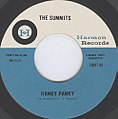Hanky Panky (Tommy James & the Shondells song)
Hanky Panky is a song that was first introduced in 1966 by rock 'n' roll band Tommy James & the Shondells .
Emergence
The song was written in November 1963 by Jeff Barry and his wife Ellie Greenwich . Under the pseudonym " The Raindrops " they sang some of their first compositions together. Their third single, That Boy John , was to be released in November 1963 , but a B-side was still missing. Hanky Panky was hastily written in just 20 minutes . The piece was superficially about a provocatively performed dance called "Hanky Panky", but this phrase in English means both "duplicity" and a sexual allusion. The two titles appeared on Jubilee # 5466, with the A side only reaching number 64 on the US pop charts.
In December 1963 the song was picked up by the "Summits" (Harmon # 1017 / Rust # 5072), which did not make it into the charts. The release of another girl group , the “Parlettes”, was also unsuccessful. That seemed to seal the play's fate. Some sources believe that the Summits released the song before the raindrops; however, the songwriters confirm that the Raindrops brought out the original version. From the strict chronological point of view of a cover version , the Raindrops are considered the original interpreters because they delivered the first studio recording of the piece.
Hit version of Tommy James & the Shondells
Tommy James of The Shondells heard the local Spinners (not identical to The Spinners ) playing Hanky Panky at a club gig in South Bend, Indiana in 1963, which delighted the audience. The Shondells were given the opportunity to record a record in February 1964 at WNIL's radio studios in Niles, Michigan . They started with Thunderbolt and then decided on Hanky Panky . The producer was the disc jockey Jack Douglas Deafenbough, who worked as "DJ Jack Douglas" at the radio station. After intense airplay at WNIL, the local record label Snap Records (# 102) released the single Hanky Panky / Thunderbolt in February 1964 . However, this version again did not meet with any public interest.
Again the piece seemed to be forgotten until April 1965 when dance promoter Bob Mack came across it in Pittsburgh and played the single at dance events. The record was then sold as a bootleg 80,000 times in Philadelphia on the Red Fox record label and thus reached number one on the local hit parade. Tommy James gave several radio interviews there, which made the single even better known. When James was asked to perform the play in Pittsburgh, the Shondells no longer existed. He hired the band Raconteurs from Pittsburgh (Joe Kessler / guitar, Mike Vale / bass, Ron Rosman / keyboards, George Magura / saxophone and Vinnie Pietropaoli / drums).
Bob Mack traveled with the band to New York in May 1966, where he visited five major record companies, all of which accepted. The sixth was Roulette Records , where label owner Morris Levy made it clear to other labels that it was his record and that they should give up. In May 1966, the group received a record deal, in the same month the - no longer newly recorded - single Hanky Panky / Thunderbolt (Roulette R4686) was released. On July 16, 1966, the single became the number one hit in the pop charts. While the song reached number 38 in England, it reached number 3 in the charts in Germany. Hanky Panky has been sold over a million times.
Producer Henry Glover ordered the hastily reassembled band to New York's Bell Sound Recording Studios , where recordings for the LP of the same name, which was released in July 1966, were still taking place in June 1966.
statistics
The song received a BMI award . A total of at least 18 cover versions of Hanky Panky were released. First grabbed Neil Diamond (Oct 1966) Hanky Panky on. Madonna published a title of the same name in June 1990 , but this has nothing to do with the Barry / Greenwich composition.
Individual evidence
- ↑ English website with the explanation of the meaning
- ^ Ken Emerson, Always Magic In The Air , 2005, p. 154
- ^ Originals Project
- ↑ Mick Patrick, Liner Notes: Do-Wah-Diddy, Words And Music By Ellie Greenwich And Jeff Barry , 2008, p. 16.
- ↑ Tommy James, Me, the Mob, and the Music: One Helluva Ride with Tommy James & The Shondells , 2010, p. 50 ff.
- ↑ Tommy James, Me, the Mob, and the Music: One Helluva Ride with Tommy James & The Shondells , 2010, p. 55.
- ^ Joseph Murrells, Million Selling Records , 1984, p. 264
- ↑ Cover info about Hanky Panky



